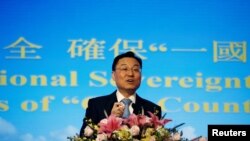Curious Washington Awaits Next Chinese Ambassador

WASHINGTON — One of the lowest points in recent Sino-American relations came in July 2021 when U.S. Deputy Secretary of State Wendy Sherman, on a visit to Beijing, was scolded by her Chinese interlocutor and handed a ‘List of U.S. Wrongdoings that Must Stop.’ Sherman was also warned during the strained encounter about what the Chinese described as the Biden administration’s ‘highly misguided mindset’ and handed a second ‘List of Key Individual Cases that China Has Concerns With.’ The man who delivered those messages, Vice Foreign Minister Xie Feng, is now widely expected in diplomatic circles to be named as the next Chinese ambassador to Washington, taking up the post recently vacated by current Chinese Foreign Minister Qin Gang. China has noticeably softened its anti-American rhetoric since a Nov. 14 meeting between U.S. President Joe Biden and Chinese leader Xi Jinping in Bali, Indonesia, and policy analysts in Washington are waiting to see whether Xie’s expected appointment portends a continuation of that trend or a return to the ‘wolf warrior’ diplomacy of recent years. The uncertainly is heightened by the fact that, despite a stint at the Chinese embassy in Washington earlier in his career, Xie remains largely a cipher even to people who make a living knowing who’s who in China, such as June Teufel Dreyer, the author of China’s Political System, now in its 10th edition. ’I don’t really know much about him,’ acknowledged Dreyer, a political science professor at the University of Miami. ‘My attitude towards the incoming Chinese ambassador is ‘wait and see’ — let’s see what he does,’ she told VOA in a phone interview. Born in 1964, Xie was promoted to his current position of vice minister of foreign affairs in February 2021 after serving as the ministry’s special envoy in Hong Kong for a little over three years. In that time, he was noticed and appreciated by higher ups for daring to engage with antagonists, local media reported at the time Xie was leaving Hong Kong for Beijing. He had been just a few months in his current post at the time of the widely reported encounter with Sherman. In that same meeting with the American diplomat and her delegation, he delivered a strongly worded rebuttal to U.S. calls for the world to adhere to a ‘rules-based order.’ ’The U.S. side’s so-called ‘rules-based international order’ is an effort by the United States and a few other Western countries to frame their own rules as international rules and impose them on other countries,’ Xie told a visiting American delegation, according to the Chinese foreign ministry and state media. By demanding adherence to a rules-based order, Xie was quoted as saying, the United States and its Western allies ‘resort to the tactic of changing the rules to make life easy for itself and hard for others, and to introduce ‘the law of the jungle’ where might is right and the big bully the small.’ Xie also told the delegation that the declared American approach to China — based on competition, cooperation where possible, and contest ‘where we must’ — is in fact aimed at deception. The core of the policy is ‘confrontation,’ he said, according to reports published on the foreign ministry’s website. ‘Cooperation’ is mere stopgap and ‘competition’ is a rhetorical trap; all America wanted was ‘one-sided absolute gains while having done everything bad imaginable,’ Xie was quoted as saying. Dreyer, in the telephone interview, acknowledged the perceived softening of Chinese rhetoric in more recent months, but said she was reserving judgment. The Chinese ‘say they want to be friends, but we need to see some concrete action, not just words, but deeds,’ she said. ’I would also remind you that people who say nice words will often stab you in the back; in other words, being nice and having nice, polite manners is one thing, but being truly nice is another. People who speak kind words [their doing so] often masks sinister intentions.’ The author also stressed that Chinese policy will be made in Beijing, not at the embassy in Washington. ’Ambassadors — our ambassadors and their ambassadors — are essentially window-dressing,’ she said. ‘They give cocktail parties; they give interviews where they say largely meaningless things. There’s not much he can do unless the party tells him to do it. In this case he’s the mouthpiece of the party.’ The same point was made by Xia Ming, a political science professor at the City University of New York’s Graduate Center, who cited volatility in Chinese domestic politics as a reason to reserve judgment on what to expect from the new envoy. ’The 20th Party Congress showed the world that Chinese politics is anything but staid or stable,’ he told VOA in a phone interview. Even greater skepticism was expressed by Republican Congressman Chris Smith, the chairman of the Congressional-Executive Commission on China and a prominent promoter of human rights around the world. ’Unless the Chinese Communist Party’s promise to soften its rhetoric is matched with a radical change in behavior and deeds, their words still mean absolutely nothing,’ said Smith, who has been sanctioned by China for calling out human rights violations that China describes as baseless. ’The CCP’s long-term strategic objective — to assert global dominance and spread its malign system abroad — is being pursued as aggressively as always. The United States must continue to combat Xi Jinping’s brutal dictatorship and hold the CCP to account for its atrocious human rights abuses,’ he said in a written response to questions from VOA.
 FILE — Xie Feng, commissioner of China’s Ministry of Foreign Affairs in Hong Kong, holds a briefing on the proposed national security legislation in Hong Kong, May 25, 2020.
FILE — Xie Feng, commissioner of China’s Ministry of Foreign Affairs in Hong Kong, holds a briefing on the proposed national security legislation in Hong Kong, May 25, 2020.

